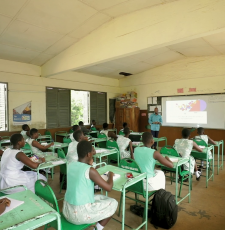
EIFL is delighted to announce a new partnership with the Namibia Library and Archives Service (NLAS), which will strengthen continued professional development of librarians at public libraries across the country.
NLAS manages a network of 65 public libraries, with 262 staff members. Currently, 60 public libraries are offering free access to computers, and 57 are also providing free access to the internet in their communities.
“The partnership with EIFL has surely come at the right time, as it will assist us to capacitate our staff members to be able to render better services to the users,” said Sarah Negumbo, Director of the NLAS in the Ministry of Education, Arts, Culture.
“NLAS libraries are shifting away from traditional book lending services, to offering different kinds of services that focus on community needs, including technology-based information and training services. The aim of the Ministry is to provide public access to information and communication technology (ICT) in all public libraries by 2020.”
TRAINING SKILLS FOR THE FUTURE
The EIFL-NLAS partnership will skill a cohort of NLAS librarians to become trainers, so that they can provide ongoing training within the NLAS network of public libraries in future.
The agreement covers the period from August 2018 to April 2020. During this period, EIFL and NLAS will jointly:
- Assess training needs of the librarians in the NLAS network.
- Train a group of 17 trainers who will train public librarians in the NLAS network.
- Develop a plan for continuous capacity building of Namibia’s public library network, deploying local trainers to conduct training.
WHAT THE TRAINING COVERS
The trainers will learn generic training skills, and training skills and knowledge in specific topics, including developing and introducing new technology-based services; re-organizing library spaces; change management; using technology to improve existing information services; how to assess the impact of library services; communications, and advocacy.
After a training and mentoring programme conducted by the EIFL team, the trainers will begin training other NLAS librarians. NLAS will be expected to develop a master plan for continuous staff training that will be integrated into the Ministry’s Human Resources Development Strategy by the end of project.
“This is EIFL’s first major capacity building activity in Namibia,” said EIFL Public Library Innovation Programme (EIFL-PLIP) Manager Ramune Petuchovaite. “Digital technology presents major opportunities for libraries to contribute to local and national development and we are really happy to be able to play a role in the exciting changes that are taking place in the Namibian libraries.”
Read our blog, Continuous Professional Development of Public Librarians, about how EIFL and the Kenya National Library Service are working together to build sustainable professional development for public librarians in Kenya.
SHARE / PRINT









